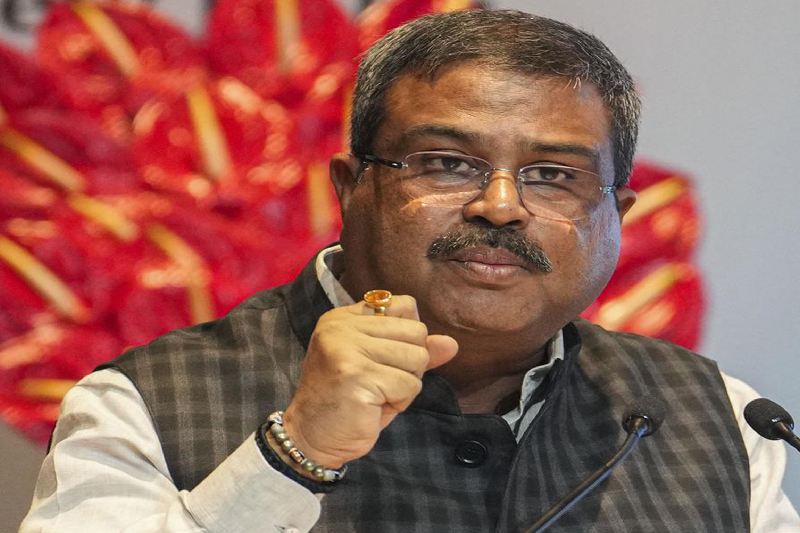
Centre Clarifies: No Language Will Be Imposed on Any State, Says Dharmendra Pradhan
Education Ministry Addresses Language Policy Concerns
Union Education Minister Dharmendra Pradhan has reiterated that the central government will not impose any language on any state, dismissing the ongoing controversy in Tamil Nadu over implementing the three-language policy. Speaking on the sidelines of the Think India Dakshinapatha Summit 2025 at IIT Madras, Pradhan emphasized that language imposition concerns are politically motivated and have unnecessarily created a fear-psychosis among parents, teachers, and students.
Pradhan pointed out that Tamil Nadu schools already offer multilingual education, with students learning Tamil, English, and Telugu from an early stage. “Where is the issue over three languages? It’s your political stand,” he noted, highlighting that the opposition’s claims of forced Hindi instruction are misplaced.
NEP 2020 and the Three-Language Framework
The National Education Policy 2020 (NEP 2020) recommends flexible multilingual education to strengthen linguistic diversity and student competencies. According to NEP guidelines:
- Classes 1 and 2: Students study two languages, including their mother tongue. For example, Tamil will be the mother tongue for students in Tamil Nadu, while the school or state can choose the second language.
- Classes 6 to 10: Students study three languages, one of which is their mother tongue, and the student or state selects the remaining two.
Pradhan stressed that this policy framework allows states considerable autonomy in determining which languages students learn. Many states had already implemented versions of the three-language policy before the NEP, showing that the NEP’s guidelines are an extension rather than a new imposition.
Tamil Nadu’s Concerns and Political Reactions
Tamil Nadu, traditionally following a two-language policy, has raised concerns over the potential imposition of Hindi under the NEP’s three-language recommendation. This has fueled political debates, with some parties portraying it as threatening regional languages and cultural identity.
Pradhan addressed these concerns directly, stating that the fears of Hindi imposition are unfounded. He clarified that learning multiple languages enhances cognitive abilities and provides students with broader cultural understanding and professional opportunities, without diminishing the role of the mother tongue.
Promoting Multilingual Competence
Pradhan highlighted the benefits of multilingual education, “There is no problem in learning multiple languages. I would like to learn Tamil because it is a vibrant society where Sangam literature was envisioned, Thirukkural was written, and has a vibrant and innovative economy. I must learn Tamil, but to understand, I must learn my mother tongue.”
This statement reinforces the government’s stance that linguistic diversity is an asset, not a burden. Multilingual learning equips students to navigate a globalized world, improves cognitive flexibility, and strengthens cultural appreciation. By retaining the mother tongue and adding additional languages, students gain enhanced communication skills and better career prospects in both national and international contexts.
Balancing Regional Identity with National Integration
The three-language framework under NEP is designed to balance regional identity with national integration. While students learn the mother tongue to stay rooted in local culture, learning additional languages facilitates interaction with other regions of India and international communities.
Pradhan’s remarks underscore the policy is inclusive and flexible, not coercive. The government emphasizes that states can implement the three-language policy according to local needs, thereby protecting linguistic heritage while promoting interstate and national connectivity.
Importance of Language Learning in the 21st Century
In a rapidly globalizing economy, multilingual competence is increasingly important. Learning multiple languages enhances academic performance and prepares students for cross-cultural interactions, higher education, and international careers. NEP 2020 advocates a holistic approach to integrating linguistic skills with cognitive, social, and vocational learning.
By making multilingual education flexible, NEP ensures students retain strong regional linguistic roots while gaining national and global competencies. This approach supports equitable learning opportunities, encouraging students from all states and socio-economic backgrounds to benefit from diverse linguistic and cultural experiences.
Addressing Misconceptions and Political Narratives
Pradhan’s clarification also addresses misconceptions and politically charged narratives surrounding the language policy. Opposition claims suggesting forced imposition of Hindi or any other language are factually incorrect and misrepresent the NEP’s intent.
He further stated that multilingual education has existed in Tamil Nadu for years, contradicting claims that NEP introduces something new or coercive. The minister urged stakeholders to focus on educational quality and holistic student development rather than politicizing language education.
Looking Ahead: Implementation and Flexibility
The government expects smooth implementation of the NEP’s multilingual framework, ensuring states can adapt the policy according to local linguistic realities. Schools can choose languages, allowing flexibility and responsiveness to regional preferences and student needs.
Pradhan’s clarification aims to reassure parents, educators, and students that NEP’s objectives are inclusive, non-coercive, and aimed at enhancing student competence. The policy encourages broader language learning by emphasizing choice and flexibility without threatening regional identities.
Conclusion
Through Dharmendra Pradhan's statements, the Union Government has made it clear that the three-language policy under NEP 2020 is not an imposition but a recommendation to enhance multilingual competence. States retain autonomy over language selection, and students continue learning their mother tongue and other languages.
As India strives to modernize its education system, multilingual learning under NEP 2020 aims to strengthen cognitive, cultural, and career competencies, fostering students rooted in their heritage while being prepared for global challenges. By addressing political misconceptions and reinforcing flexibility, the government ensures that the language policy becomes a tool for empowerment, not contention, shaping a more inclusive, competent, and multilingual generation.



